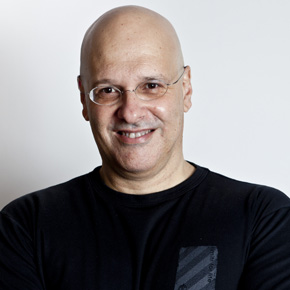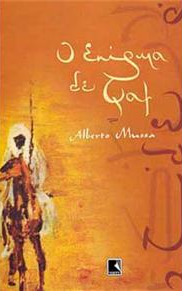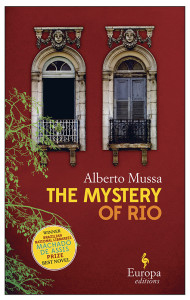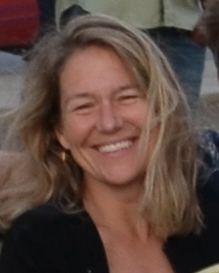Alberto Mussa’s timeless fictions
by Kim M. Hastings My first introduction to Alberto Mussa’s writing was in 2008, when a mutual friend gave me a copy of his remarkable novel O enigma de Qaf (‘The Riddle of Qaf’) as a gift. I was immediately struck by the extraordinary literary quality; by the extensive research, imagination, and sensibility that had clearly informed the work; and perhaps most of all, by the contacts, connections, and questions the story revealed to exist across times, cultures and lands. I wanted to know and read more, and to my delight, not long afterward, I met Beto during what must have been a fated encounter at a café in Rio. Within days, he made sure I had copies of his complete works, which I began to devour en route back to my home in the US. I found the stories of Elegbara gripping, as they overturn conventionally accepted ‘truths’ in Brazilian history to consider events and historical figures from other angles, other points of view. Meu destino é ser onça (‘My fate is to be a jaguar’) is equally absorbing in presenting Tupi cannibalism as a metaphysical way of ridding the world of evil. The crime series Mussa is working on – which began with O trono da rainha Jinga (‘Queen Jinga’s throne’), now includes O senhor do lado esquerdo (published in translation by Europa Editions as The Mystery of Rio), and is to be followed by three more volumes – serves as a compendium of criminal activity in the city of Rio de Janeiro from the days of its founding five centuries ago.
My first introduction to Alberto Mussa’s writing was in 2008, when a mutual friend gave me a copy of his remarkable novel O enigma de Qaf (‘The Riddle of Qaf’) as a gift. I was immediately struck by the extraordinary literary quality; by the extensive research, imagination, and sensibility that had clearly informed the work; and perhaps most of all, by the contacts, connections, and questions the story revealed to exist across times, cultures and lands. I wanted to know and read more, and to my delight, not long afterward, I met Beto during what must have been a fated encounter at a café in Rio. Within days, he made sure I had copies of his complete works, which I began to devour en route back to my home in the US. I found the stories of Elegbara gripping, as they overturn conventionally accepted ‘truths’ in Brazilian history to consider events and historical figures from other angles, other points of view. Meu destino é ser onça (‘My fate is to be a jaguar’) is equally absorbing in presenting Tupi cannibalism as a metaphysical way of ridding the world of evil. The crime series Mussa is working on – which began with O trono da rainha Jinga (‘Queen Jinga’s throne’), now includes O senhor do lado esquerdo (published in translation by Europa Editions as The Mystery of Rio), and is to be followed by three more volumes – serves as a compendium of criminal activity in the city of Rio de Janeiro from the days of its founding five centuries ago.
O movimento pendular (‘The balance of the pendulum’), from which I translated the story ‘The Game of Errors’, sets out to be a comprehensive study of adultery, a catalogue of all possible three-way relationships in human societies – but as the narrator admits in the very first chapter, that’s not quite the book he wrote…
Beto and I have kept up a correspondence since our initial meeting and continue to get together whenever I am in Brazil. The remarks that follow are a compilation of our email exchanges and ongoing conversation.
You have a reputation as a writer who researches with passion, delving into history and mythology and retrieving stories that warrant rereading – and retelling. What draws you to the texts, or tales, you choose to work with?
There are two strong preconceptions these days – about the production and the purpose of literature – that are taking over and informing the thought of most writers, or at least of many Brazilian authors. The first is that there are no longer any new stories; everything there is to tell has already been told, by the classics of the past. What’s left, then, to the writer of the twenty-first century is to create ‘language’. The plot thus becomes devoid of meaning and what stands out is the discourse itself. This strikes me as an impoverishment of fiction, which goes against its very premise, as I see it. When fiction arose, in Egypt, at least two thousand years ago, extraordinary stories were told. What pleased people, and made them think, were stories, not discourses.
 The second preconception, which may be more universal, is that writers are the spokespeople of their time and have to discuss the great themes of their age, depict the anguish, doubts, and dramas of their contemporaries. Unfortunately, today’s world doesn’t interest me much. Living in it is enough for me. And I think I live intensely. What motivates me, what provokes intellectual emotion in me, is understanding Homo sapiens, humans as a species. The present is but one very short, very narrow moment in the manifest existence of these beings. In order to reach all of their real dimensions, to have complete knowledge of the species, we need to displace ourselves in both time and space. In one of my stories, there’s a character who says: “It’s impossible for people who watch the sun from their doorway to know the truth.” I deeply believe this.
The second preconception, which may be more universal, is that writers are the spokespeople of their time and have to discuss the great themes of their age, depict the anguish, doubts, and dramas of their contemporaries. Unfortunately, today’s world doesn’t interest me much. Living in it is enough for me. And I think I live intensely. What motivates me, what provokes intellectual emotion in me, is understanding Homo sapiens, humans as a species. The present is but one very short, very narrow moment in the manifest existence of these beings. In order to reach all of their real dimensions, to have complete knowledge of the species, we need to displace ourselves in both time and space. In one of my stories, there’s a character who says: “It’s impossible for people who watch the sun from their doorway to know the truth.” I deeply believe this.
The measure of humans in time is the story (or history) they give us. Their measure in space is mythology – because each culture has its own, original way of conceiving of humans. Mythology, in particular, seems to me the most perfect literary form: because it weds minimal expression with maximum content. It’s where the great themes that have amazed us since our appearance on the planet are treated. Humans’ ability to recount is inexhaustible. As the anthropologist Claude Lévi-Strauss showed, and as Borges did in his stories, each and every story is the re-creation of another. Therefore, it’s always possible to tell singular new stories, from the old. That’s what I like to do.
Your work definitely has a Borgesian quality to it: your predilection for the short story and essay as genres (on which your novels are arguably built), the deliberate blurring of fact and fiction, the level of narrative sophistication – the expectation that the reader brings a certain knowledge and receptiveness to your work. Would you agree?
Yes. When I started to think about becoming a writer, I had a very hard time finding a way to express myself, my own narrative style. Even though I’d been exposed to literature ever since I was young, my intellectual output up until then was theory-based. My higher education had been in maths and linguistics. I also read a lot of anthropology books. So I wrote mostly essays. That was what I knew how to do. But in the university environment back then (the late 1980s), new writers were expected to create ‘language’. The great reference in this sense was the work of Guimarães Rosa. And I simply didn’t know how to write like him. My Portuguese was classical; it was the refined language used for essay writing.
When I discovered Borges’s prose (after reading Bioy Casares’s The Invention of Morel) it was a revelation because, first, I realised that Borges’s language was the same classical language of the essay that I already had a command of. I realised I could create literature without having to be a poet like Guimarães Rosa. I could write in the Portuguese I already knew.
And second, I saw that Borges created literature, created fiction, based on theoretical problems which were philosophical, mathematical, metaphysical in nature. I could relate to that world, not only because I had studied maths but because I was immersed in ethnology at the time, studying African and Amerindian languages. My personality as a writer was completely Borgesian, in both form and content. Reading Borges, I freed myself from the pressure exerted by Guimarães Rosa and was able to start writing.
 How would you define your intended audience?
How would you define your intended audience?
I think my readers need to be well-educated. They have to like adventure, getting to know exotic worlds, exploring the unknown. They have to like riddles and suspense. They also have to be open to the supernatural. And above all, they have to have a good sense of humour, because the primary goal of literature is to make us laugh at life.
Your work covers a broad range of different themes, both universal and local. Crime and violence are a particular, recurring interest and the subject of a five-volume history you’ve been working on. Can you tell us more about both?
Violence is a constant in human history. Homo sapiens can be characterised, perhaps almost exclusively, for killing individuals of their own species. War has always been part of humans’ history and seems to have no end. But killing a man in war isn’t a crime. No known society considers killing an enemy a crime. There’s only a crime when the individual killed belongs to the killer’s own group, or when the death occurs outside the circumstances of war (when killing is legitimate).
In no society, not even the most violent, is crime ever taken lightly. On the contrary, it represents an extreme act, extreme behaviour. There’s no better way to understand human nature than to place an individual in an extreme situation. That’s why every crime is literary. Literature explores precisely that: human possibilities.
As for the five police thrillers, my idea is to create a mythical backdrop of Rio de Janeiro. There will be five novels, each set in one of the centuries of Rio’s history. I’m aiming to bring together the three themes I’m interested in: crime, history, and mythology.
How about sexuality? O movimento pendular and O senhor do lado esquerdo are studies of adultery and eroticism, two other uniquely human practices…
Adultery, like crime, is an extreme situation. I’ve never heard of a society in which the concept doesn’t exist, in which there isn’t some kind of sexual restriction. Sexual expression is never completely free. Even in today’s world. We may be more or less tolerant, but there’s always something prohibited. This makes sexuality a fascinating topic in itself. Because we’re dealing with very dark worlds. Mythologies are filled with stories of adultery. Novels about adultery are among the best of world literature. I think human sexuality is so complex that only fiction can dare to try to explain it.
‘The Game of Errors’ offers a daring explanation of a purported rape. Where did the idea for the story come from?
I needed a story with a love triangle in which several people felt betrayed at the same time… The idea behind the novel (which is a book made up of stories, like The Thousand and One Nights) is part of my reading of Lévi-Strauss, especially his Mythologiques series, in which he studies the mythology of the indigenous peoples of the Americas. I had the impression that variants of a myth result from small mathematical operations applied to the narrative. I decided to do an experiment with stories about adultery, which to me are the most interesting and universal. That’s where the narrator came in, a man who studied stories of adultery and proposed a method for coming up with a new and different story by transforming a pre-existing story. In the process, he manages to develop a general theory of adultery. Berenice’s story is part of this. It can be read as an independent story but it’s part of a general theory too. And the story relates to those alongside it through a transformation of a mathematical nature.
Do you have a regular or daily writing routine? What inspires you from day to day?
My readings are what motivate me to write. I typically read a lot, study up, before beginning a novel or even a short story. Generally, I’ll start from a myth that I want to retell, reinterpret. Then I come up with the whole plan for the story. Sometimes I make maps, character sketches. Only then, after all that, when I have the complete outline, do I begin to write. But I don’t have a routine. I write a little at a time, slowly, with no set schedule.
What are you reading now?
I’m always reading, all the time. Since I’m writing a detective novel, I’m rereading classics of the genre, like Umberto Eco’s The Name of the Rose and Dostoevsky’s The Brothers Karamazov. I also recently reread a collection of crime-fiction short stories by Faulkner, Knight’s Gambit. Since my latest novel takes place in the sixteenth century, I’ve been dealing with the letters of the Jesuits and books written by travellers from that era. I also read everything I possibly can about indigenous mythology. Not long ago I read O mundo místico dos caruanas e a revolta de sua ave (‘The mystic world of the Caruanas and the revolt of their bird’), by a shaman, Zeneide Lima, and the classic O selvagem (‘The savage’), by General Couto de Magalhães. Other than that, the same authors as always: Machado de Assis, Lima Barreto, Nelson Rodrigues, Borges and Bioy Casares.
Your new novel is the third in your proposed multivolume crime history. The first two, O trono da rainha Jinga and O senhor do lado esquerdo, involve a secret brotherhood of African slaves and a brothel of unusual seductions. What is the premise or setting of this latest work?
I’ve just finished A primeira história do mundo (‘The first history of the world’). It’s the fictional re-creation of a real case: the first murder to take place in Rio de Janeiro, in 1567, two years after the city was founded. The victim’s wife was the cause. And there were ten suspects. It was therefore a crime of passion, at least in the eyes of the authorities of the time. I use the case to blend indigenous mythology and anthropological facts in an effort to reconstruct the crime and discover the real killer.
Alberto Mussa was born in Rio de Janeiro in 1961 and studied mathematics and linguistics, focusing on African and Amerindian languages. He is the author of five acclaimed novels and a short-story collection. He has also translated the al-muallaqat (suspended odes) from classical Arabic and re-created the mythology of the Tupinambá Indians. His work has appeared in seven languages and been published internationally. He has received awards from the Casa de Las Americas, the Brazilian National Library, and the Brazilian Academy of Letters.
 Kim M. Hastings studied Brazilian language and literature at Brown University and has a PhD in Spanish and Portuguese from Yale. She has translated fiction by Lúcia Bettencourt, Rubem Fonseca, Rachel Jardim, Marcelo Moutinho and Edgard Telles Ribeiro. Her translation of Ribeiro’s O punho e a renda is published (as His Own Man) by Scribe, and forthcoming from Faber & Faber and Other Press.
Kim M. Hastings studied Brazilian language and literature at Brown University and has a PhD in Spanish and Portuguese from Yale. She has translated fiction by Lúcia Bettencourt, Rubem Fonseca, Rachel Jardim, Marcelo Moutinho and Edgard Telles Ribeiro. Her translation of Ribeiro’s O punho e a renda is published (as His Own Man) by Scribe, and forthcoming from Faber & Faber and Other Press.

